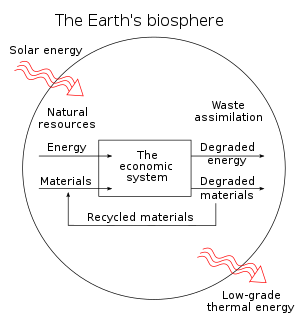A Quote by Herman E. Daly
Even if we could grow our way out of the crisis and delay the inevitable and painful reconciliation of virtual and real wealth, there is the question of whether this would be a wise thing to do. Marginal costs of additional growth in rich countries, such as global warming, biodiversity loss and roadways choked with cars, now likely exceed marginal benefits of a little extra consumption. The end result is that promoting further economic growth makes us poorer, not richer.
Quote Topics
Additional
Benefits
Biodiversity
Consumption
Costs
Could
Countries
Crisis
Delay
Economic
Economic Growth
End
End Result
Even
Exceed
Extra
Further
Global
Global Warming
Grow
Growth
Inevitable
Likely
Little
Loss
Makes
Marginal
Now
Our
Out
Painful
Poorer
Promoting
Question
Real
Real Wealth
Reconciliation
Result
Rich
Rich Countries
Richer
Thing
Us
Virtual
Warming
Way
Wealth
Whether
Wise
Would
Would Be
Related Quotes
If top marginal income tax rates are set too high, they discourage productive economic activity. In the limit, a top marginal income tax rate of 100 percent would mean that taxpayers would gain nothing from working harder or investing more. In contrast, a higher top marginal rate on consumption would actually encourage savings and investment. A top marginal consumption tax rate of 100 percent would simply mean that if a wealthy family spent an extra dollar, it would also owe an additional dollar of tax.
The capitalist system is about taking from the Earth and from the other great commodity, labour. What's happening with this system is that the rich are getting richer and the poor are getting poorer, and the only way out of it is supposed to be growth. But growth is debt. It's going to make the situation worse.
We're richer, but that wealth doesn't reflect durable, authentic economic value - which is hitting fast diminishing returns. The growth that we're pursuing is neither sustainable - nor is it, in many ways, real growth at all. Boardrooms from finance to autos to energy to pharma to fashion have learned that the hard way.
If we had 3 percent growth, which is what we're trying to get to, what we're at, by the way, right now, we're trying to maintain that 3 percent growth. If we had been at 3 percent growth over the last ten years, the budget very nearly would be balanced in 2017. That's how big a difference it makes when you grow the American economy that additional 1 percent over ten years.
A person looking after a frail former lover is not working and not contributing to economic growth. But if he or she stopped, the state would probably have to take over, thereby adding to growth. So, to increase growth, we should stop looking after our loved ones. Could anybody explain to a passing Martian how this makes sense?
China's accumulation of reserves is a result of the IMF's mismanagement of the Asian financial crisis a decade or so ago. If countries know they can't rely on the IMF to help them, their best defense is their own reserve cushion. In a time of spreading global recession, too much emphasis on savings in surplus countries like China can impede prospects for global growth.
I feel we have to begin standing our ground in the places we love. I think that we have to demand that concern for the land, concern for the Earth, and this extension of community that we've been speaking of, is not marginal - in the same way that women's rights are not marginal, in the same way that rights for children are not marginal. There is no separation between the health of human beings and the health of the land. It is all part of a compassionate view of the world.



































